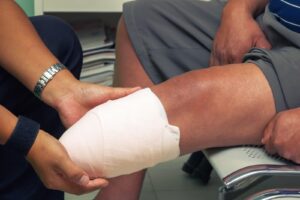What Are the Physical and Psychological Effects of Amputation?

According to the Amputee Coalition, approximately 185,000 amputations occur in the United States each year. Among the over 2 million people currently living with limb loss, a significant number faced amputations due to vascular diseases like diabetes and peripheral arterial disorders such as trauma and cancer. Injury from trauma to the musculature and nerves can lead to compartment syndrome of the leg, which is a serious condition that occurs when pressure builds up within the muscle compartments. In such instances, where the pressure built up is not timely relieved, and the diagnosis of compartment syndrome is missed, then the unrelieved pressure build-up can lead to muscle loss, nerve damage, and deficiencies with blood flow. In some bad cases of compartment syndrome, amputation may be the only successful line of treatment for the injured patient.
Amputation doesn’t just create monumental physical challenges to the amputee but can also trigger myriads of mental health issues. Here are the physical and psychological effects of amputation that you should know about:
Physical Effects of Amputation
Limited mobility and dexterity
The main physical effect of lower limb amputation is that it reduces the amputee’s ability to move around freely. Although you can gain some mobility with the help of a prosthetic limb, you will still not be able to walk and do some physical activities as you did pre-injury. This is because the loss of the upper limb will likely affect your balance.
Stump and phantom limb pain
In most cases, amputees suffer from stump pain, phantom limb pain, or both. Stump pain is typically experienced in the remaining parts of the affected limb. This pain generates itself from the damaged nerves at the site of the amputation. Phantom pain is usually experienced by up to 80% of amputees. Phantom pain is the sensation of pain that you feel in the missing part of your body, such as when a limb is amputated. Phantom pain has no known cause but some experts believe that it is an adjustment from the brain pathways and spinal cord used to signaling the missing leg.
Muscle Contractures
Muscle contractures are caused by an imbalance of muscles in the amputee’s limb. The most affected persons are the lower limb amputees owing to the sudden and drastic alteration of the central nervous system and anatomy. It could also result from the amputee’s imbalanced postures as one is forced to remain in one fixed position for extended periods.
Fatigue
Another physical effect of amputation is increased levels of tiredness and fatigue. This is because the amputee needs extra effort and energy to perform routine activities. An amputee typically exerts additional pressure on the remaining limb as they walk with their prosthetic limb. Fatigue and drowsiness can also be caused by the side effects of pain medications.
Psychological Effects of Amputation
Trauma
It is common for amputees to suffer from post-traumatic stress disorders (PTSD), especially where they experienced a traumatic amputation. Symptoms of traumatic effects of amputation vary and may include flashbacks, anger outbursts, insomnia, depression, nightmares, avoidance, and other problematic behaviors. It is also important to note that the people close to amputees are also impacted by feelings of sadness, anxiety, or guilt. Spouses and parents affected by their partner’s or child’s loss are too faced with the stresses of becoming a primary caregiver.
Self-esteem and confidence issues
Understandably, the amputee’s body image will be affected by the loss. However, this loss can also trigger a person’s sexual identity issues. Most men and women affected by amputation report having feelings of inadequacy post-surgery. These problems can trigger depression and anxieties if no timely intervention is done.
Key Takeaways
Amputation is physically and emotionally devastating for the victims. It is such a momentous event in the amputee’s life that most victims are at a loss on how to respond to the changes. Victims of the injury must receive the help and support they need to accept the situation and adopt an optimistic outlook on life. With the right care, life after amputation can return to normal. If you have any questions on how to get compensation after catastrophic injuries, turn to our team of attorneys. We can help you after a delay in diagnosis of compartment syndrome, a medical malpractice incident, serious accident, or other injuries caused through no fault of your own. For more information, contact us today.
